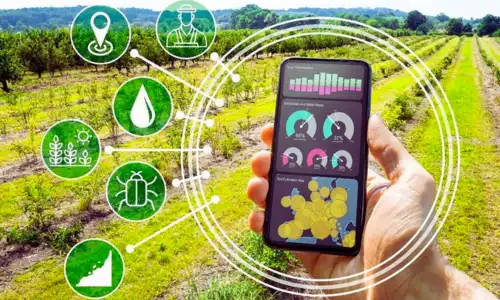Agriculture, a cornerstone of human civilization, is undergoing a profound transformation with the integration of Artificial Intelligence (AI). The advent of precision farming, empowered by AI technologies, is reshaping the agricultural landscape, promising increased efficiency, sustainability, and yields. In this comprehensive exploration, we delve into the significant strides made by AI in precision farming, its applications across the agricultural spectrum, and the transformative impact it holds for the future of agriculture.
The Evolution of Precision Farming:
Traditional farming practices, often reliant on manual labor and intuition, are being superseded by precision farming. Also known as precision agriculture or smart farming, this approach leverages cutting-edge technologies, including AI, machine learning, sensors, and data analytics. The journey towards precision farming has seen the gradual incorporation of technologies that empower farmers to make data-driven decisions for optimized crop management and resource utilization.
AI in Crop Monitoring and Management:
AI technologies are making a profound impact on crop monitoring and management. Drones equipped with high-resolution cameras and sensors capture detailed images of fields, allowing AI algorithms to analyze crop health, detect diseases, and assess nutrient levels. This real-time data empowers farmers to take proactive measures, applying fertilizers or pesticides precisely where needed, thereby reducing waste and environmental impact.
• Disease Detection:
AI-powered systems can analyze images captured by drones or sensors to detect early signs of crop diseases. By identifying subtle changes in plant color, texture, or structure, these systems can alert farmers to potential issues, allowing for timely intervention.
• Nutrient Management:
AI helps optimize nutrient levels by analyzing soil data and recommending tailored fertilization plans. By understanding the nutritional needs of crops, farmers can apply fertilizers more efficiently, reducing waste and minimizing environmental impact.
• Weed Identification and Control:
AI algorithms can distinguish between crops and weeds in images, facilitating targeted weed control. This enables farmers to use herbicides selectively, reducing the need for widespread application and promoting sustainable farming practices.
• Crop Health Monitoring: Drones equipped with AI-powered cameras capture multispectral images of fields, allowing for detailed analysis of crop health. AI algorithms can identify stress factors such as water scarcity or pest infestations, guiding farmers in implementing precise interventions.
• Precision and Efficiency:
AI enables precise targeting of interventions, whether it be applying fertilizers, pesticides, or water. This precision leads to more efficient resource utilization, reducing costs and minimizing environmental impact.
• Timely Intervention:
Early detection of diseases or nutrient deficiencies allows farmers to intervene promptly, preventing the escalation of problems. This proactive approach contributes to healthier crops and higher yields.
• Optimized Resource Use:
AI-driven recommendations for nutrient application and irrigation help farmers optimize the use of resources. This not only conserves water and reduces the need for chemicals but also improves overall sustainability.
• Data-Driven Decision-Making:
The wealth of data generated by AI systems provides farmers with valuable insights. Data-driven decision-making empowers farmers to adapt quickly to changing conditions, enhancing overall farm management.
• Increased Productivity
By leveraging AI for crop monitoring and management, farmers can increase productivity through improved crop health, reduced losses, and more efficient use of resources.
Predictive Analytics for Weather and Yield:
Predictive analytics, driven by AI, has become a game-changer in agriculture. Machine learning models analyze historical weather data, soil conditions, and crop performance to predict future outcomes. Farmers can access accurate forecasts, enabling them to plan planting and harvesting activities more efficiently. This not only improves yield but also minimizes losses due to adverse weather events.
Automated Machinery and Robotics:
The integration of AI into automated machinery and robotics is reshaping the physical landscape of farming. Smart tractors equipped with AI systems can navigate fields autonomously, performing tasks such as planting and harvesting with precision. Robotics play a crucial role in activities like weeding, fruit picking, and packing. These technologies not only enhance efficiency but also address labor shortages in many agricultural regions.
AI-Enabled Irrigation Systems:
Water scarcity poses a significant challenge in agriculture. AI-driven irrigation systems address this issue by using sensors to measure soil moisture levels and monitor weather conditions. By analyzing this data, AI algorithms optimize irrigation schedules, ensuring crops receive the right amount of water at the right time. This not only conserves water, but also improves crop health and reduces operational costs.
Challenges and Considerations:
While the adoption of AI in agriculture brings substantial benefits, it is not without challenges. Farmers need access to technology, reliable connectivity, and the skills to interpret and apply AI-driven insights. Additionally, there are concerns about data privacy, cybersecurity, and the ethical use of AI in agriculture. Addressing these challenges is crucial to ensuring that the benefits of AI are accessible to all farmers and sustainable in the long term.
The Future of AI in Precision Farming:
The future of agriculture holds exciting possibilities as AI technologies continue to evolve. Precision farming is expected to become even more sophisticated, with predictive models incorporating satellite imagery, climate data, and genetic information to provide comprehensive insights. The integration of the Internet of Things (IoT) will further enhance connectivity and data exchange between devices on the farm.
AI-powered autonomous machinery may become more commonplace, reducing the need for human intervention in routine tasks. This not only addresses labor shortages but also allows farmers to focus on strategic decision-making and more complex aspects of farm management.
AI's Impact on Precision Farming for Engineering Students
1. Foundations of Precision Agriculture:
• Explore the fundamental concepts of precision agriculture, emphasizing the integration of advanced technologies for improved farming practices.
• Recognize the vital role engineering plays in developing solutions that enhance precision and efficiency in agriculture.
2. Innovative Sensor Networks:
• Engineering Smart Agriculture Sensors: Engage in the design and implementation of intelligent sensor networks, enabling real-time data collection on soil conditions, crop health, and environmental variables.
• Sensor Integration Skills: Develop expertise in sensor technologies, data acquisition, and wireless communication protocols.
3. Visualizing Crop Health with Computer Vision:
• Harnessing Computer Vision: Dive into the realm of computer vision applications for monitoring crop health using drones or imaging devices.
• Engineering Vision Systems: Acquire skills in image processing, machine learning, and algorithm development for effective crop health assessment.
4. Autonomous Precision Agriculture Vehicles:
• Building Autonomous Farming Tech: Develop autonomous vehicles and drones capable of performing precision tasks such as seeding, spraying, and harvesting.
• Robotics and Control Systems: Master the principles of robotics, control systems, and machine learning algorithms for seamless navigation and task execution.
5. Predictive Analytics for Optimal Yield:
• AI-Driven Yield Optimization: Develop predictive models utilizing AI algorithms to optimize crop yield based on historical data, weather forecasts, and agricultural practices.
• Data Science Skills: Acquire proficiency in data analytics, statistical, modelling, and machine learning for accurate yield predictions.
6. Intelligent Irrigation Systems:
• Efficient Water Management: Engineer intelligent irrigation systems that adapt to real-time weather conditions and soil moisture levels.
• Integration of AI in Agriculture: Explore the integration of sensors, actuators, and AI algorithms for precise and efficient water resource management.
7. Data-Driven Decision Support Systems:
• Empowering Farmers with Data: Develop platforms that leverage data analytics to provide actionable insights for informed decision-making in agriculture.
• Big Data Engineering: Learn about big data processing, database management, and user interface design for comprehensive decision support.
8. Supply Chain Optimization in Agriculture:
• AI in Agricultural Logistics: Investigate the role of AI in optimizing the agricultural supply chain, from production to distribution.
• Logistics Optimization Skills: Develop expertise in logistics optimization, demand forecasting, and AI-driven decision-making for efficient supply chain management.
9. Climate Modelling for Agricultural Resilience:
• Understanding Climate Impact: Develop climate models to assess the impact of climate change on agriculture and recommend adaptive strategies.
• Climate Data Analysis: Gain proficiency in climate data analysis, modeling techniques, and AI applications for resilient agricultural planning.
10. Human-Machine Interaction in Agriculture:
• User-Centric Design: Create interfaces and apps that facilitate seamless interaction between farmers and AI-powered systems.
• Human-Computer Interaction Skills: Explore principles of human-computer interaction, natural language processing, and voice recognition for user-friendly experiences.
11. Promoting Sustainable Agriculture with AI:
• Sustainable Farming Practices: Investigate the role of AI in promoting sustainable farming practices, such as organic farming and agroforestry.
• Environmental Impact Assessment: Understand the principles of environmental impact assessment, modelling, and AI applications for sustainable agriculture.
Summarize the contributions of engineering students in the dynamic field of AI-driven precision farming.
Emerging Trends: Explore future opportunities, challenges, and emerging trends that present avenues for continued innovation in precision agriculture.
By exploring these diverse facets of precision farming, engineering students can not only hone their technical skills but also contribute to the transformation of agriculture through innovative and sustainable technological solutions.
Conclusion:
In conclusion, the fusion of AI and agriculture is revolutionizing the way we grow and harvest our food. Precision farming, powered by AI, is not just a technological advancement; it is a pathway to a more sustainable and efficient future for agriculture. By harnessing the power of data, machine learning, and automation, farmers can make informed decisions that optimize resource use, reduce environmental impact, and increase productivity.
The growing role of AI in precision farming is a testament to the potential for technology to address global challenges and secure the future of food production. As we navigate the complexities of modern agriculture, the partnership between farmers and AI will continue to yield a bountiful harvest for generations to come. The journey towards a technologically advanced and sustainable agricultural future is well underway, and AI is at the forefront of this transformative revolution.
Engaging in projects related to the role of AI in precision farming not only provides valuable hands-on experience for engineering students but also contributes to the advancement of technology in agriculture, addressing challenges such as food security and sustainable farming practices.
Mrs. Anjana Verma



